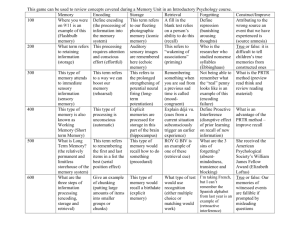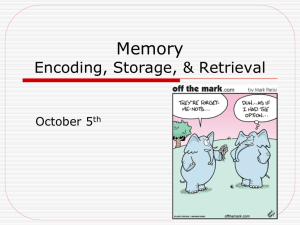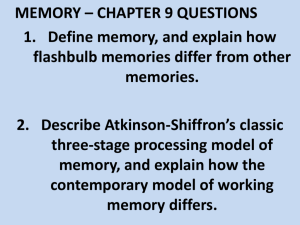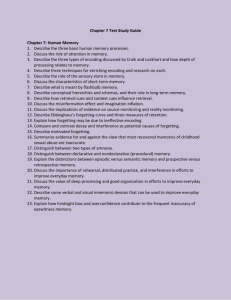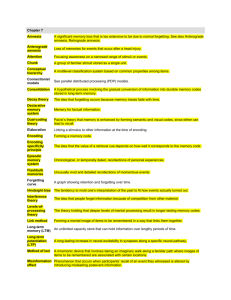Chapter 6: Memory
advertisement
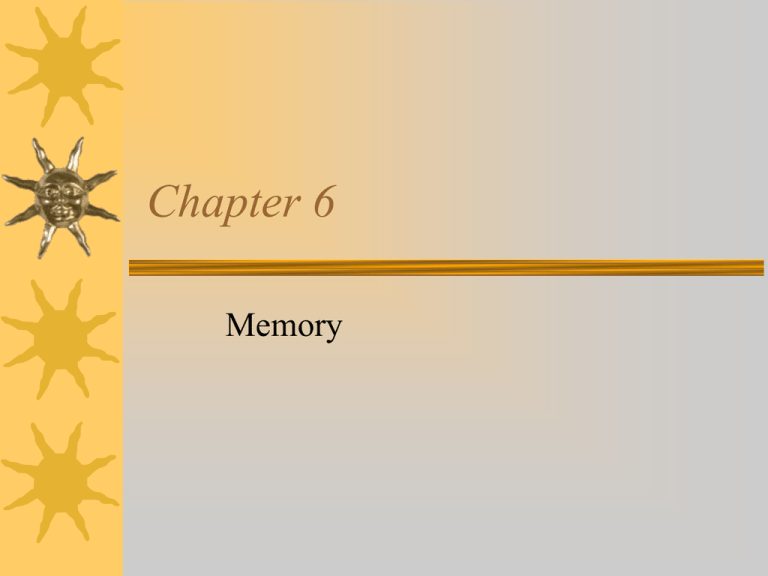
Chapter 6 Memory Memory The mental processes that enable us to retain and sue information over time Encoding The process of transforming information into a form that can be entered into and retained by the memory system Storage The process of retaining information stored in memory so that it can be used later in time Retieval The process of recovering information so that we are consciously aware of it. Stage model of memory A model describing memory as consisting of three distinct stages; sensory memory, short term memory, and long-term memory Sensory memory The stage of memory that registers information from the environment and holds it for a very brief period in time Short-term memory / Working Memory The active stage of memory in which information is stored for about 30 seconds Long-term Memory The stage of memory that represents the long-term storage of information Maintenance Rehearsal The mental or verbal repetition of information in order to maintain it beyond the usual 30 –seconds duration of shortterm memory Chunking Increasing the amount of info that can be held in short-term memory by grouping related items together into a single unit Elaborative rehearsal Rehearsal that involves focusing on the meaning of information to help encode and transfer it to long-term memory Levels of Processing framework the view that info that is processed at a deeper(more meaningful) level is more likely to be remembered than info that is processed at a shallow level Procedural memory Category of long-term memory that includes memories of different skills, operations, and actions Episodic memory Category of long-term memory that includes memories of particular events Semantic memory Category of long-term memory that includes memories of general knowledge of facts, names and concepts Explicit memory Information or knowledge that can be consciously recollected; also known as declarative memory Implicit memory Information or knowledge that affects behavior or task performance but cannot be consciously recollected Clustering Organizing items into related groups during recall from long-term memory Semantic Network Model A model that describes units of information in long-term memory as being organized in a complex network of association Retrieval The process of accessing stored information Retrieval cue A clue, prompt, or hint that helps trigger recall of a given piece of information in long-term memory Retrieval Cue Failure The inability to recall long-term memories because of inadequate or missing retrieval cues Tip-of-the tongue Experience A memory phenomenon that involves the sensation of knowing that specific information is stored in long-term memory, but being temporarily unable to retrieve it Recall A test of long-term memory that involves retrieving information without the aid of retrieval cues; also called Free Recall Cued Recall A test of the long-term memory that involves remembering an item of information in response to a retrieval cue Recognition A test of long-term memory that involves identifying correct information out of several possible choices Serial Position Effect The tendency to remember items at the beginning and end of a list better than items in the middle Encoding Specificity Principle The principle that when the conditions of information retrieval are similar to the conditions of information encoding, retrieval is more likely to be successful Context effect The tendency to recover information more easily when the retrieval occurs in the same setting as the original learning of the information State-dependent Retrieval An encoding specificity phenomenon in which information that is learned in a particular drug state is more likely to be recalled while the person is in the same state Mood Congruence An encoding specificity phenomenon in which a given mood to evoke memories that are consistent with that mood Flashbulb Memory The recall of very specific images or details surrounding a vivid, rare, or significant personal event Schema An organized cluster of information about a particular topic Source Confusion A memory distortion that occurs when the true source of the memory is forgotten Cryptomnesia A memory distortion in which a seemingly “new” or “original” memory is actually based on an unrecalled previous memory Misinformation effect A memory-distortion phenomenon in which a person’s existing memory can be altered if the person I exposed to misleading information Forgetting the inability to recall information that was previously available Encoding failure The inability to recall specific info because of insufficient encoding for storage in a long term memory Interference Theory The theory that forgetting is caused by one memory competing with or replacing the other Retroactive interference Forgetting in which new memory interferes with remembering an old memory; backward-acting memory interference Proactive interference forgetting in which the old memories interfere with remembering an old memory Motivated Forgetting the theory that forgetting occurs because an undesired memory is held back from awareness Suppression Motivated forgetting that occurs consciously Repression Motivated forgetting that occurs unconsciously Decay theory The view that forgetting is due to normal metabolic processes that occur in the brain over time Memory Trace The brain changes associated with a particular memory stored Long-term potentiation A long-lasting increase in synaptic strength between two neurons Amnesia Severe memory loss Retrograde amnesia Loss of memory, especially for episodic information; backward-acting amnesia Memory consolidation The gradual, physical process of converting new, long-term memories to stable, enduring long-term codes Anterograde amnesia Loss of memory cause by the inability to store new memories; forward- acting amnesia People Hermann Ebbinghaus German psychologist who originated the scientific study of forgetting; plotted the first forgetting curve, which describes the basic pattern of forgetting learned information over time Eric Kandel American neurobiologist who won the Nobel Prize in 2000 for his work on the neural basis of learning and memory in the sea snail Aplysia Karl Lashley American physiological psychologist who attempted to find the specific brain location of particular memories Elizabeth Loftus American psychologist who has conducted extensive research on the memory distortions that can occur in eyewitness testimony George Sperling American psychologist who identified the duration of visual sensory memory in a series of classical experiments in 1960 Richard Thompson American psychologist and neuroscientist who has conducted extensive research on the neurobiological foundations of learning and memory



